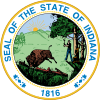Nominations
Durbin (member of the Indiana Republican Central Committee) was nominated to run for governor in 1900, and easily won the convention vote.
Opinion was strongly against Democrats, and the leading members of the party refused to run for governor that year. The party fielded John Kern, a former state senator serving at the time as city solicitor of Indianapolis, to oppose Durbin.
This page is based on this
Wikipedia article Text is available under the
CC BY-SA 4.0 license; additional terms may apply.
Images, videos and audio are available under their respective licenses.



